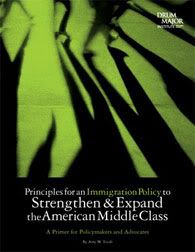
DMI (The Drum Major Institute for Public Policy Change), a progressive think tank founded by Ambassador Andrew Young has released a policy paper entitled: “Principles for an Immigration Policy to Strengthen and Expand the American Middle Class”.
The report focuses on a examination of the issue with the aim of approaching the issue from the standpoint of how immigration benefits the American middle class and how policy could be changed to support the middle class and immigrants alike.
The the report addresses the issue from two standpoints:
- The need to change immigration policy to provide legal channels for immigration, and that immigration is a benefit to society on a whole.
- The need to ensure that immigrants are treated fairly in the workplace with a stress on organization and unioization. The report also asserts that if employers were not able to exploit undocumented workers to drive down labor costs, all American workers would benefit.
Elana Levin, DMI Communications Manager says:
“It’s a total re-think of orthodoxy on all sides and I feel that it’s the sort of middle class and labor oriented analysis that will sell real well in… (middle class and working class) areas.”
Executive Summary
The debate over the future of immigration policy in this country is expected to become one of the most pressing policy conversations in the year ahead.
That debate can be a positive one that helps us to define our future as a nation or a negative one that draws upon fears and inaccuracies for the purpose of dividing people who should be united in the common cause of preserving access to the American Dream.
We argue that immigration policy must be connected to the larger conversation about America’s squeezed middle class and those striving to attain a middle-class standard of living. Accordingly, the Drum Major Institute offers a lens through which to evaluate immigration policy that operates from the basic principle that immigration policy is sound only if it also helps to strengthen and expand America’s middle class. Our litmus test for evaluating immigration policy or advocacy agendas by its impact on the middle class is two-fold:
1) Immigration policy should bolster–not undermine–the critical contribution that immigrants make to our economy as workers, entrepreneurs, taxpayers and consumers, because:
- On average, immigrants pay more in taxes each year than they use in government services, and these taxes fund programs like Social Security that strengthen and expand the middle class.
- The middle class relies on the goods and services that immigrants produce.
- By increasing consumer demand, immigrants generate economic growth that benefits the middle class: immigration is a major contributor to the expansion of Hispanic and Asian-American consumer markets–an estimated 12 percent of the nation’s 2004 purchasing power.
- Immigrants also stimulate the economy by starting small businesses and attracting investment capital from their countries of origin.
Since the American middle class relies on the economic contributions of immigrants, a pro-middle-class immigration policy must not include mass deportation or aim to shut down future immigration.
2) Immigration policy must strengthen the rights of immigrants in the workplace.
- Under current immigration law, immigrant workers compete with their U.S.-born counterparts on an uneven playing field–to the detriment of both groups.
- Because employers threaten undocumented immigrants with deportation, these workers cannot effectively assert their rights in the workplace by, for example, asking for raises, complaining about violations of wage and hour or workplace safety laws, or by supporting union organizing drives.
- As long as this cheaper and more compliant pool of immigrant labor is available, employers are all too willing to take advantage of the situation to keep their labor costs down and are less willing to hire U.S.-born workers if they demand better wages and working conditions.
- U.S.-born workers are left to either accept the same diminished wages and degraded working conditions as immigrants living under threat of deportation or to be shut out of whole industries where employers hire predominantly undocumented immigrants.
When immigrants lack rights in the workplace, labor standards are driven down, and all working people have less opportunity to enter or remain part of the middle class. So a pro-middle-class immigration policy must guarantee immigrants full labor rights and make sure that employers cannot use deportation as a coercive tool in the labor market.
On an issue as important as the future of immigrants in America, we cannot allow proposed legislative programs to drive the conversation. Instead, we must articulate core values that speak to the concerns of working Americans from San Diego, California, to Portland, Maine, and allow those principles to determine our legislative and advocacy strategies. DMI’s “Principles for an Immigration Policy to Strengthen and Expand the American Middle Class: A Primer for Policymakers and Advocates” is our contribution to this important conversation.
Although I have some reservations as to the reports assertions of the effect of immigration on the US job market vis a vis the displacement of the native workforce, their analysis of the need to end the exploitation of immigrant labor and the call for legalization and unionization are spot on.
All in all this is an excellent piece of research and makes some very interesting recommendations. This is definitely a must read for anyone interested in progressive immigration reform.
Principles for an Immigration Policy to Strengthen and Expand the American Middle Class (PDF)
Also of interest: A Legislative Analysis of Border Protection, Antiterrorism, and Illegal Immigration Control Act (PDF)
Katrina vanden Heuvel, editor of The Nation, has written an excellent analysis of the report entitled Toward a Sensible Immigration Policy
Cross posted from Migra Matters




